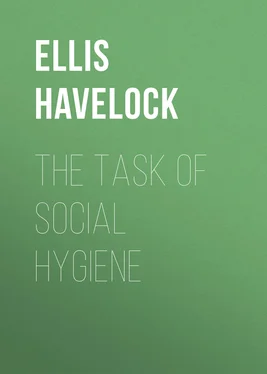Havelock Ellis - The Task of Social Hygiene
Здесь есть возможность читать онлайн «Havelock Ellis - The Task of Social Hygiene» — ознакомительный отрывок электронной книги совершенно бесплатно, а после прочтения отрывка купить полную версию. В некоторых случаях можно слушать аудио, скачать через торрент в формате fb2 и присутствует краткое содержание. Жанр: psy_sex_and_family, foreign_psychology, foreign_edu, на английском языке. Описание произведения, (предисловие) а так же отзывы посетителей доступны на портале библиотеки ЛибКат.
- Название:The Task of Social Hygiene
- Автор:
- Жанр:
- Год:неизвестен
- ISBN:нет данных
- Рейтинг книги:5 / 5. Голосов: 1
-
Избранное:Добавить в избранное
- Отзывы:
-
Ваша оценка:
- 100
- 1
- 2
- 3
- 4
- 5
The Task of Social Hygiene: краткое содержание, описание и аннотация
Предлагаем к чтению аннотацию, описание, краткое содержание или предисловие (зависит от того, что написал сам автор книги «The Task of Social Hygiene»). Если вы не нашли необходимую информацию о книге — напишите в комментариях, мы постараемся отыскать её.
The Task of Social Hygiene — читать онлайн ознакомительный отрывок
Ниже представлен текст книги, разбитый по страницам. Система сохранения места последней прочитанной страницы, позволяет с удобством читать онлайн бесплатно книгу «The Task of Social Hygiene», без необходимости каждый раз заново искать на чём Вы остановились. Поставьте закладку, и сможете в любой момент перейти на страницу, на которой закончили чтение.
Интервал:
Закладка:
It cannot be disputed that the transformation by which the propagation of the race became deliberate and voluntary has not been established in social custom without a certain amount of protestation from various sides. No social change, however beneficial, ever is established without such protestation, which may, therefore, be regarded as an inevitable and probably a salutary part of social change. Even some would-be scientific persons, with a display of elaborate statistics, set forth various alarmistic doctrines. If, said these persons, this new movement goes on at the present pace, and if all other conditions remain unchanged, then all sorts of terrible results will ensue. But the alarming conclusion failed to ensue, and for a very sufficient reason. The assumed premises of the argument were unsound. Nothing ever goes on at the same pace, nor do all other conditions ever remain unchanged. The world is a living fire, as Heraclitus long ago put it. All things are in perpetual flux. Life is a process of perpetual movement. It is idle to bid the world stand still, and then to argue about the consequences. The world will not stand still, it is for ever revolving, for ever revealing some new facet that had not been allowed for in the neatly arranged mechanism of the statistician.
It is perhaps unnecessary to dwell on a point which is now at last, one may hope, becoming clear to most intelligent persons. But I may perhaps be allowed to refer in passing to an argument that has been brought forward with the wearisome iteration which always marks the progress of those who are feeble in argument. The good stocks of upper social class are decreasing in fertility, it is said; the bad stocks of lower social class are not decreasing; therefore the bad stocks are tending to replace the good stocks. 11 11 Thus Heron finds that in London during the past fifty years there has been 100 per cent increase in the intensity of the relation between low social birth and high birth-rate, and that the high birth-rate of the lower social classes is not fully compensated by their high death-rate (D. Heron, "On the Relation of Fertility in Man to Social Status," Drapers' Company Research Memoirs , No. I, 1906). As, however, Newsholme and Stevenson point out ( Journal Royal Statistical Society , April, 1906, p. 74), the net addition to the population made by the best social classes is at so very slightly lower a rate than that made by the poorest class that, even if we consent to let the question rest on this ground, there is still no urgent need for the wailings of Cassandra.
It must, however, be pointed out that, even assuming that the facts are as stated; it is a hazardous assumption that the best stocks are necessarily the stocks of high social class. In the main no doubt this is so, but good stocks are nevertheless so widely spread through all classes—such good stocks in the lower social classes being probably the most resistent to adverse conditions—that we are not entitled to regard even a slightly greater net increase of the lower social classes as an unmitigated evil. It may be that, as Mercier has expressed it, "we have to regard a civilized community somewhat in the light of a lamp, which burns at the top and is replenished from the bottom." 12 12 Sociological Papers of the Sociological Society, 1904, p. 35.
The soundness of a stock, and its aptitude for performing efficiently the functions of its own social sphere, cannot, indeed, be accurately measured by any tendency to rise into a higher social sphere. On the whole, from generation to generation, the men of a good stock remain within their own social sphere, whether high or low, adequately performing their functions in that sphere, from generation to generation. They remain, we may say, in that social stratum of which the specific gravity is best suited for their existence. 13 13 There is a certain profit in studying one's own ancestry. It has been somewhat astonishing to me to find how very slight are the social oscillations traceable in a middle-class family and the families it intermarries with through several centuries. A professional family tends to form a caste marrying within that caste. An ambitious member of the family may marry a baronet's daughter, and another, less pretentious, a village tradesman's daughter; but the general level is maintained without rising or falling. Occasionally, it happens that the ambitious and energetic son of a prosperous master-craftsman becomes a professional man, marries into the professional caste, and founds a professional family; such a family seems to flourish for some three generations, and then suddenly fails and dies out in the male line, while the vigour of the female line is not impaired.
Yet, undoubtedly, from time to time, there is a slight upward social tendency, due in most cases to the exceptional energy and ability of some individual who succeeds in permanently lifting his family into a slightly higher social stratum. 14 14 The new social adjustment of a family, it is probable, is always difficult, and if the change is sudden or extreme, the new environment may rapidly prove fatal to the family. Lorenz ( Lehrbuch der Genealogie , p. 135) has shown that when a peasant family reaches an upper social class it dies out in a few generations.
Such a process has always taken place, in the past even more conspicuously than in the present. The Normans who came over to England with William the Conqueror and constituted the proud English nobility were simply a miscellaneous set of adventurers, professional fighting men, of unknown, and no doubt for the most part undistinguished, lineage. William the Conqueror himself was the son of a woman of the people. The Catholic Church founded no families, but its democratic constitution opened a career to men of all classes, and the most brilliant sons of the Church were often of the lowliest social rank. We should not, therefore, say that the bad stocks are replacing the good stocks. There is not the slightest evidence for any such theory. All that we are entitled to say is that when in the upward progression of a community the vanishing point of culture and refinement is attained the bearers of that culture and refinement die off as naturally and inevitably as flowers in autumn, and from their roots spring up new and more vigorous shoots to replace them and to pass in their turn through the same stages, with that perpetual slight novelty in which lies the secret of life, as well as of art. An aristocracy which is merely an aristocracy because it is "old"—whether it is an aristocracy of families, or of races, or of species—has already ceased to be an aristocracy in any sound meaning of the term. We need not regret its disappearance.
Do not, therefore, let us waste our time in crying over the dead roses of the summer that is past. There is something morbid in the perpetual groaning over that inevitable decay which is itself a part of all life. Such a perpetual narrow insistence on one aspect of life is scarcely sane. One suspects that these people are themselves of those stocks over whose fate they grieve. Let us, therefore, mercifully leave them to manure their dead roses in peace. They will soon be forgotten. The world is for ever dying. The world is also for ever bursting with life. The spring song of Sursum corda easily overwhelms the dying autumnal wails of the Dies Iræ .
It would thus appear that, even apart from any deliberate restraint from procreation, as a family attains the highest culture and refinement which civilization can yield, that family tends to die out, at all events in the male line. 15 15 See, on this point, Reibmayr, Entwicklungsgeschichte des Talentes und Genies , Vol. I, ch. vii.
This is, for instance, the result which Fahlbeck has reached in his valuable demographic study of the Swedish nobility, Der Adel Schwedens . "Apparently," says Fahlbeck, "the greater demands on nervous and intellectual force which the culture and refinement of the upper classes produce are chiefly responsible for this. For these are the two personal factors by which those classes are distinguished from the lower classes: high education and refinement in tastes and habits. The first involves predominant activity of the brain, the last a heightened sensitiveness in all departments of nervous life. In both respects, therefore, there is increased work for the nervous system, and this is compensated in the other vital functions, especially reproduction. Man cannot achieve everything; what he gains on one side he loses on the other." We should do well to hold these wise words in mind when we encounter those sciolists who in the presence of the finest and rarest manifestations of civilizations, can only talk of race "decay." A female salmon, it is estimated, lays about nine hundred eggs for every pound of her own weight, and she may weigh fifty pounds. The progeny of Shakespeare and Goethe, such as it was, disappeared in the very centuries in which these great men themselves died. At the present stage of civilization we are somewhat nearer to Shakespeare and Goethe than to the salmon. We must set our ideals towards a very different direction from that which commends itself to our Salmonidian sciolists. "Increase and multiply" was the legendary injunction uttered on the threshold of an empty world. It is singularly out of place in an age in which the earth and the sea, if not indeed the very air, swarm with countless myriads of undistinguished and indistinguishable human creatures, until the beauty of the world is befouled and the glory of the Heavens bedimmed. To stem back that tide is the task now imposed on our heroism, to elevate and purify and refine the race, to introduce the ideal of quality in place of the ideal of quantity which has run riot so long, with the results we see. "As the Northern Saga tells that Odin must sacrifice his eye to attain the higher wisdom," concludes Fahlbeck, "so Man also, in order to win the treasures of culture and refinement, must give not only his eye but his life, if not his own life that of his posterity." 16 16 Fahlbeck, op. cit. , p. 168.
The vulgar aim of reckless racial fertility is no longer within our reach and no longer commends itself as worthy. It is not consonant with the stage of civilization we are at the moment passing through. The higher task is now ours of the regeneration of the race, or, if we wish to express that betterment less questionably, the aggeneration of the race. 17 17 Regeneration implies that there has been degeneration, and it cannot be positively affirmed that such degeneration has, on the whole, occurred in such a manner as to affect the race. Reibmayr ( Die Entwicklungsgeschichte des Talentes und Genies , Bd. I, p. 400) regards degeneration as a process setting in with urbanization and the tendency to diminished population; if so, it is but another name for civilization, and can only be condemned by condemning civilization, whether or not physical deterioration occurs. The Inter-departmental Commission on Physical Deterioration held in 1904, in London, concluded that there are no sufficient statistical or other data to prove that the physique of the people in the present, as compared with the past, has undergone any change; and this conclusion was confirmed by the Director-General of the Army Medical Service. There is certainly good reason to believe that urban populations (and especially industrial workers in factories) are inferior in height and weight and general development to rural populations, and less fit for military or similar service. The stunted development of factory workers in the East End of London was noted nearly a century ago, and German military experience distinctly shows the inferiority of the town-dweller to the country-dweller. (See e.g. Weyl, Handbuch der Hygiene , Supplement, Bd. IV, pp. 746 et seq. ; Politisch-Anthropologische Revue , 1905, pp. 145 et seq. ) The proportion of German youths fit for military service slowly decreases every year; in 1909 it was 53.6 per cent, in 1910 only 53 per cent; of those born in the country and engaged in agricultural or forest work 58.2 were found fit; of those born in the country and engaged in other industries, 55.1 per cent; of those born in towns, but engaged in agricultural or forest work, 56.2 per cent; of those born in towns and engaged in other industries 47.9 per cent. It is fairly clear that this deterioration under urban and industrial conditions cannot properly be termed a racial degeneration. It is, moreover, greatly improved even by a few months' training, and there is an immense difference between the undeveloped, feeble, half-starved recruit from the slums and the robust, broad-shouldered veteran when he leaves the army. The term "aggeneration"—not beyond criticism, though it is free from the objection to "regeneration"—was proposed by Prof. Christian von Ehrenfels ("Die Aufsteigende Entwicklung des Menschen," Politisch-Anthropologische Revue , April, 1903, p. 50).
Интервал:
Закладка:
Похожие книги на «The Task of Social Hygiene»
Представляем Вашему вниманию похожие книги на «The Task of Social Hygiene» списком для выбора. Мы отобрали схожую по названию и смыслу литературу в надежде предоставить читателям больше вариантов отыскать новые, интересные, ещё непрочитанные произведения.
Обсуждение, отзывы о книге «The Task of Social Hygiene» и просто собственные мнения читателей. Оставьте ваши комментарии, напишите, что Вы думаете о произведении, его смысле или главных героях. Укажите что конкретно понравилось, а что нет, и почему Вы так считаете.












